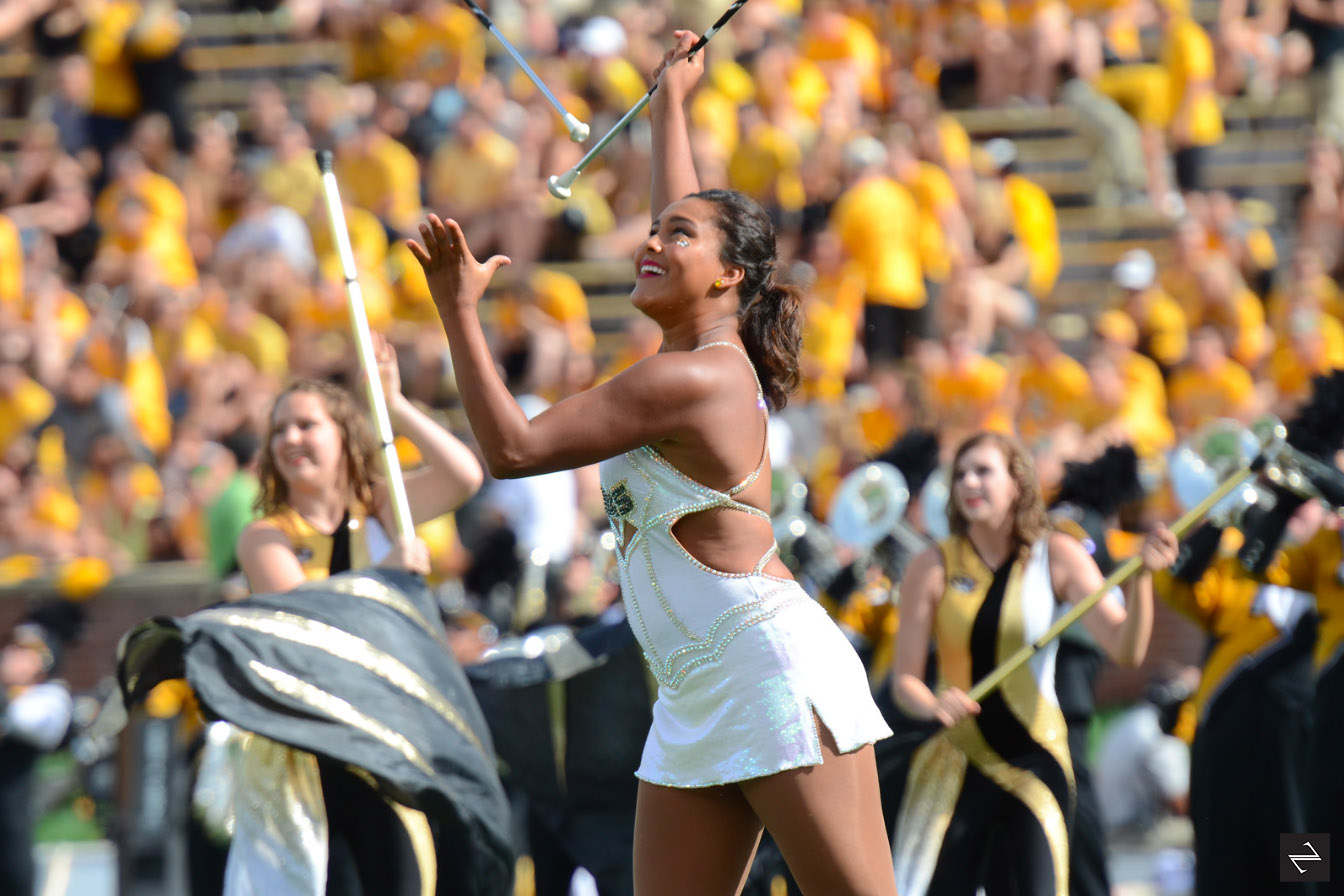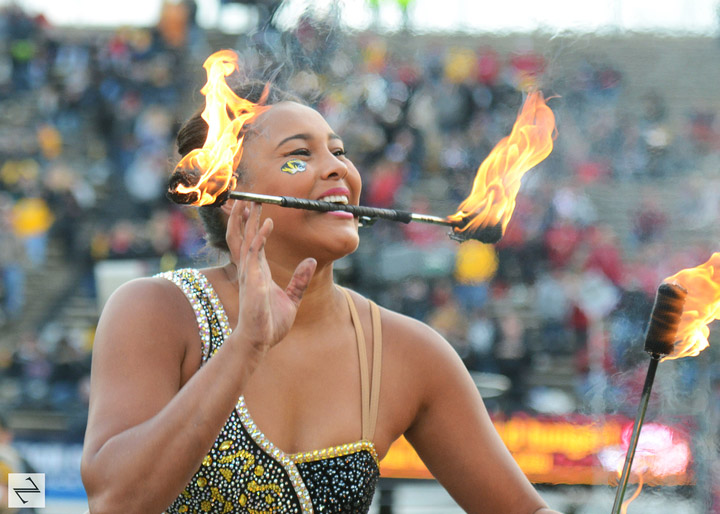World champion baton twirler gains new perspective at Mizzou
Simone Esters is one of the world’s most elite baton twirlers. But today, as she questions her competitive future, she's reigniting her love of the sport.

Simone Esters does the same thing. Every time.
She wipes her hands, then she wipes her feet. It’s a sign that Esters is about to compete. Before stepping into any competitive routine, she ritualistically rubs her palms and soles like she’s making sure they’re still there. The routine is a way for Esters to get comfortable in a tense environment that’s never really stopped making her anxious. “I hate having attention on me,” Esters says. “It’s my biggest pet peeve.”
The thing is, Esters is amazing when the attention is on her. She’s one of the best baton twirlers in the world, was crowned “Miss Majorette of America” twice, and is a feature twirler for Marching Mizzou. “Simone is very athletic and extremely graceful, so many of her moves look effortless,” Stacey Emch, her lifelong twirling coach, says. “Her style is beautiful, and we enhance them with surprise elements. The result is a stunning twirler that people love to watch.”
As a kindergartener in her hometown of Hermitage, Pennsylvania, Esters picked up a baton for the very first time. And as she enters her sophomore year of college at MU, she’s still holding on. If you ask her, she doesn’t remember why she began twirling. But she remembers why she kept going — it was after Emch told her, “If you keep practicing, you’ll get to win a trophy some day.” Today, the twirler has more trophies than her hands can count.
But that doesn’t mean she’s happy.
“To be completely honest, I’m to the point where if I wasn’t good at it, I probably wouldn’t stick with it,” Esters says. “Sometimes there are days I don’t want to do it. I feel like that’s with any athlete at this level — I do it because I know I have the ability to be successful.”


Preparing for nationals or worlds, Esters does the same as any elite athlete would: “a combination of strength, endurance, and working to build mentally and physically better each practice. She has lessons on a daily basis, as well as her own practice,” Emch says.
But it’s a common myth that the best athletes in the world love what they do. Maybe an athlete’s path to competition began with an innocent intrigue and love for their sport, like it did with Esters. But often times, as one ascends to a certain level of expertise, the audience’s expectations (for better or worse) increase as well. It’s no different for Esters, who says this shift changed her approach to twirling forever.
“It’s a different mindset when you’re so nervous because you know you have the chance to win it all and you’re not just having fun. I love twirling, but I wouldn’t call it a hobby that I do on the side. It’s not like, ‘Oh, if I win, that would be awesome,” Esters says.
“You don’t just do it. You do it to win.”
If you’re looking for Simone’s inspiration to succeed, look no further than her parents, Julie Forndael and Jeff Esters, who played basketball and football, respectively, at the University of Pittsburgh. Esters says her upbringing created the goal-oriented, focused and driven individual she’s become. But the success that came as a result of these traits also provided an unpredictable consequence.
“After I won the national title, I didn’t really feel like I loved it as much because I was trying to prove myself to others,” she says. If Esters had a drop during a routine, people asked her what was wrong — if she wasn’t perfect, something wasn’t right.
This is not right, Esters thought. It was almost as if people forgot she was a human with the most human trait of all: making mistakes. In the way a child will never view Christmas the same once finding out Santa Claus isn’t real, Esters would never approach twirling with the same innocence and unconditional love as she once did. It was then that she accepted her competitive drive is permanently a part of her, but her love for twirling is not.
She admits that she wouldn’t be twirling today if it weren’t for what happened last July:
0.5.
Five-tenths of a point. Simone Esters won’t forget that number, at least not anytime soon. It’s the number that won’t let her leave competitive twirling. It’s also the amount of points that kept her from a collegiate national championship this summer. Esters earned the second-highest point total among 80 of the country’s best twirlers, and that’s exactly the problem: she finished in second place.
“It just means I was that close. It’s a mindset,” Esters says.
“You don’t just do it, you do it to win.”
Esters may be ready to retire from competitive twirling, but her competitive spirit isn’t. It’s this ingrained drive that won’t let her leave without being on top. “I’m happy with the accomplishments I’ve achieved, but I’m still goal orientated,” Esters says. “There’s still one thing I want to cross off my list, and I’m going to make it happen.”
This is the internal battle that swarms inside Esters: she wants to stop competing, but she wants to finish as the best even more. It’s a personal struggle that she and the people around her know all too well — it’s just a part of who she is.
“Simone will tell you no matter how many times she competes or performs, the nerves and pressure to do her best are always there,” Emch says.
“I’ve set goals for myself in my twirling career, and once I achieve them, I’m done,” Esters adds. “After that, who knows? There’s nothing else for me to accomplish. This is the last thing I have to cross off my list, then I’m done.”

Esters already knows how she’ll turn her final dream into reality. It’s a simple and effective approach she’s taken her entire twirling career: set a goal and work hard until you get there. She’s taken this same approach outside of twirling, and it’s worked. On top of morphing herself into one of the best twirling talents in the country, she’s excelled academically, skipping the first grade getting into the school of her choice, the University of Missouri School of Journalism, and becoming a Walter Williams Scholar.
“Twirling has done so much for me, but making the decision to come to MU was based solely on academics. A degree from the journalism school, that’s what’s really going to take me places in life,” she says.
Mizzou had always been on her mind, but things didn’t really change until Esters made the 10-hour trip from Pennsylvania to attend the Southeastern Conference school. “I have a few friends from high school, but twirling was what I wanted to do. It was the goal for myself,” Esters says — a thorough social life isn’t necessarily available to a child prodigy who spends her time perfecting a single craft. “After school, I had gymnastics and dance practice, and it was hard to make friends with my schedule. For me to come to school and have a normal experience, it’s something that I knew I wanted in college.”
An active member of Alpha Chi Omega and twirler for Marching Mizzou — this is the experience Esters has wanted from the moment she stepped in Columbia. And as a feature twirler on game day, she’s still doing some of the same tricks, but this time for a different and more fulfilling reason.
“I feel like I’m actually twirling for myself again,” Esters says, smiling. “There’s no competition, and it’s just fun. Everyone’s cheering so loud, everyone is so passionate, and everyone loves Mizzou.”
And that’s why Esters loves MU — not only because it’s given her the ability to approach life with the same successful mindset, but also because it’s given her a new perspective on the sport she’s worked toward her entire life. Twirling with Marching Mizzou takes away the forces that have pressured her into leaving competitive twirling. Even if it’s just for a moment, it’s helped her forget that Santa Claus isn’t real.
“It just feels like Columbia is my home now. It’s awesome.”
This doesn’t mean Esters is done with twirling. Not by a long shot.
Although her days of competing are almost over, Esters is already giving back to the sport that’s provided her with a template for success. “I teach six girls back in my hometown,” Esters says. “This year was our first nationals, and that was a really cool experience for me, putting myself in a different position and watching.”
“They all look up to her,” says Emch, who allows Esters to teach in her studio. “Simone is going to be a great coach. She is patient and persistent with them, encouraging, and always pushing just a bit harder. She’s a great role model for young children because she’s humble and honest. I think she’s ready to start judging and coaching more soon.”
Esters thinks she’s ready too. “I feel like that was the beginning of my transition,” she says. “I was more excited and nervous for them than I ever was for myself.”
She may be looking to leave competitive twirling, but Esters isn’t leaving behind what made her great. Simone Esters is going to do what she’s done her entire life: set a goal and work hard until that goal is achieved. Because “You don’t just do it, you do it to win.”
Photos by Nick Mebruer
